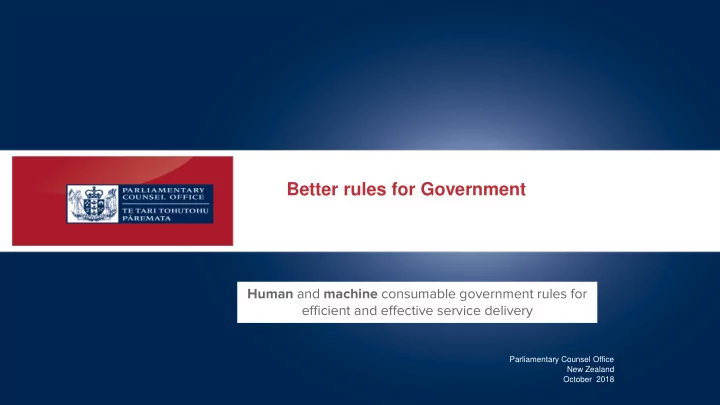

Better rules for Government Human and machine consumable government rules for efficient and effective service delivery Parliamentary Counsel Office New Zealand October 2018
Objectives How do we transition our analog, paper-based government ‘rules’ (legislation, operational policies) into a format that is human and machine consumable? How do we develop policy & legislation that is user-centred, considers service delivery from the outset, and enables the use of digital technology (including ones we haven’t thought of yet)? What options are there for the production of machine consumable legislation, and how do we test these with real legislation?
Drivers Better designed policies, reflected in legislation and reflected in services – more efficient and effective; policy intent not ‘lost’ by the time we reach delivery stage Recurring barriers to digitising government services (eg. requiring things ‘in writing’ and to be witnessed) The need to have easily updatable rules to support integrated service delivery, e.g. Life Event approaches
Who was on the team? Inland Revenue Parliamentary Counsel Office (PCO) Service Innovation Lab MBIE A private sector software company 3 week discovery sprint
Concept models: Rates Rebate
Decision model: Rates Rebate
Flow model: Rates Rebate
Example of legislation, pseudocode and software code Determining if a person is eligible for a rates subsidy Legislation Pseudocode Software code (bold text denotes defined terms) A person is eligible for a rates A person is eligible for a rates is_eligible = False if is_ratepayer and subsidy for a property only if subsidy if, on the relevant date: is_residential_property and all of the following is true at the 1. the person is a usual_place_of_residence: relevant date : ratepayer; and is_retirement_subsidy = ● The person is a 2. the property for which False ratepayer of the is_eligible = True the rates are paid is a property . ● residential property; The property is a residential property . and ● The property is the 3. the property is the usual place of usual place of residence of the residence of the person. ratepayer.
Key findings It is difficult to produce machine consumable rules if the policy and legislation has not been developed with this output in mind. Multidisciplinary teams of policy analysts, legislative drafters, service designers and software developers should co-design the policy and legislation, taking a user-centric approach that focuses on effective delivery. Co-designing rules/definitions increases the chances of the policy being implemented effectively and as intended. It can reduce the time it takes to deliver on the policy intent as there is more focus on understanding the problem state before leaping to solutions. Machine consumable legislation that is co-developed: ● enables other legislation, business rules, and service delivery software to be developed in parallel, ensuring consistency of application, and speeding up service delivery ● increases the opportunities to automate and integrate service delivery (including through the use of artificial intelligence). Agreed common frameworks , reference points and data points can be used to guide the development of rules without the need for further translation of the intent and logic. Not all legislation is suitable for machine consumption, but a multi-disciplinary approach will assist in making better policies and the rules and services that flow from that.
Implications for a law drafting office? Some laws already empower digital decision making, • but making law as code would have far reaching consequences • (publication, skills, staffing, process) and face real challenges (transparency, public participation, inflexibility). • So assume for now, that law will continue to be made in human • consumable language (but watch developments!) but that the process of making law will change with new players, using • new conceptual tools, and services and code developed in parallel
Thank you for your attention
Recommend
More recommend